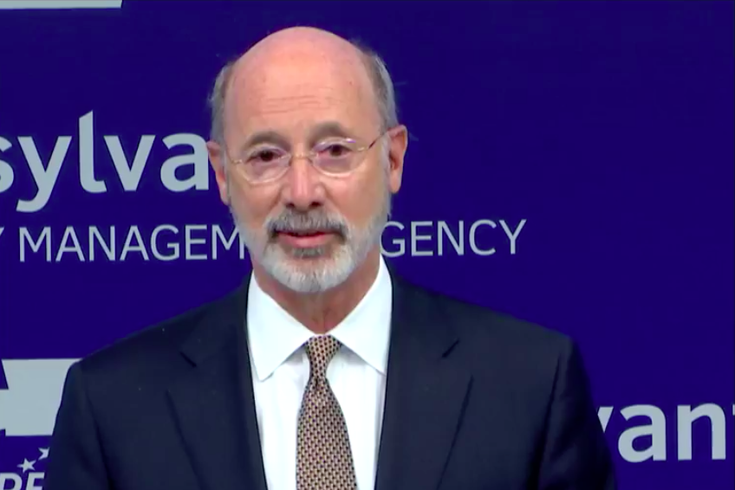
April 20, 2020
 Screenshot/PACast.com
Screenshot/PACast.com
Pennsylvania's stay-at-home order has been extended through May 8, Gov. Tom Wolf announces.
New COVID-19 cases in Pennsylvania have stabilized, but the statewide stay-at-home order will remain in place through May 8, Gov. Tom Wolf announced Monday afternoon.
At that point, state officials hope to begin relaxing restrictions by using a gradual – and regional – approach. That means the areas hit hardest by the coronavirus, like Philadelphia, could remain under a stay-at-home order beyond May 8.
"We're going to go as fast as we reasonably can," Wolf said. "We're going to take the same measured approach to reopening as we took to closing. ... If we open in a rural area, that does not mean we're opening the stay-at-home orders in places like Philadelphia."
Southeastern Pennsylvania has been under a stay-at-home order since March 23, when Wolf began ramping up such restrictions on a county-by-county basis. By April 1, the entire state was under a stay-at-home order originally set to expire April 30.
Despite the extension, Wolf emphasized that some loosened restrictions are on their way. Curbside pickup is now available at 176 state liquor sales – a move that will help state officials determine whether curbside pickup can be expanded safely to other businesses currently closed by the pandemic.
The number of businesses permitted to use online notary services is expanding, paving the way for online car sales. Plus, some limited construction will be permitted beginning May 8. Wolf called these measures the first "small steps" toward a return to normalcy.
"I want to caution that this is not going to be resuming operations as they were in February," Wolf said. "We still do not have a vaccine. We still do not have an antibody test, and we still do not have a way to cure COVID-19."
The announcement came as protesters outside the state Capitol called for an end to the shutdown. Hundreds of people gathered side-by-side to voice their demands, ignoring social distancing guidelines advised by public health officials.
“Jesus is my vaccine” is one of the more colorful messages here. pic.twitter.com/vw5qolIlHC
— Miguel Marquez (@miguelmarquez) April 20, 2020
The so-called "ReOpen PA" protest followed similar demonstrations held in several other states over the weekend. Many of these protests, which pushed medical misinformation, reportedly were backed by a far-right, pro-gun group.
Only 22% of Americans support these protests, according to a Yahoo News/YouGov poll released Monday. Only 36% of Republicans support them.
Philadelphia Mayor Jim Kenney called the protesters "short-sighted" during his daily briefing.
"Even though I understand people's right to express their views and First Amendment protection, you don't have a right get infected or be infected, and then go to a place where you're going to infect others," Kenney said. "I just wish people wouldn't do that. I understand the concern. It's very stressful. But doing that activity without social distancing is very dangerous and very reckless."
Wolf defended his decisions and encouraged the protesters to stay safe while they expressed their opinions.
"Like anybody else, if I could snap my fingers or wave a magic wand and get to a place where we're back to where we were in January, I'd do it in a heartbeat," Wolf said. "The question we all have to face is: what's the reality if we go too quickly? This could be unsafe for people."
The White House issued guidelines last week advising states to refrain from implementing a phased reopening until robust diagnostic testing is in place and daily COVID-19 cases are trending downward for at least 14 days.
Heath Secretary Dr. Rachel Levine announced 948 new COVID-19 cases on Monday – the fourth straight day the daily total declined and the first time since April 1 that cases fell below 1,000. Pennsylvania has confirmed 33,232 cases, including 1,204 deaths, since March 6.
"We have seen a flattening of the rate of increase," Wolf said. "It's too early to declare victory, but we're making progress."
Wolf reiterated that efforts to begin reopening Pennsylvania are dependent upon several factors, including "adequate" diagnostic testing capabilities and personal protective equipment supplies. The state also will enact a monitoring and surveillance program to swiftly contain new outbreaks.
Additionally, limitations on public gatherings and visitation policies will remain in place for the foreseeable future. Many of the measures currently in place at retail outlets – like occupancy limits and specific shopping hours for vulnerable populations – may remain in place, too.
"If we are making this decision based on evidence and we see evidence that says we were moving too fast in this area or this business sector, we can retreat," Wolf said. "The goal is to keep Pennsylvanians safe, but we also want to give ourselves hope and we want to start this process back as quickly as we can."